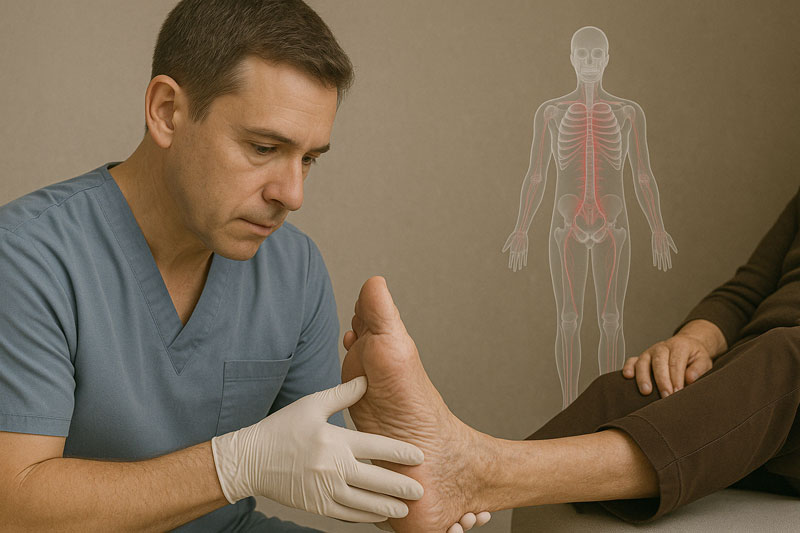Your feet play a bigger role in your overall health than you might think. From balance and mobility to early indicators of systemic conditions like diabetes or circulatory issues, foot health is directly tied to your overall well-being. Prioritizing regular foot care can lead to better posture, fewer injuries, and even early detection of health problems.
Why Foot Health Matters for Your Entire Body
Your feet support your entire body. When something’s off, such as poor alignment, inflammation, or chronic pain, it can affect everything from your knees and hips to your back and posture.
Key impacts of poor foot health include:
- Reduced mobility and balance
- Increased risk of falls or injury
- Compensatory pain in other joints (like knees, hips, or spine)
The human foot has 26 bones, 33 joints, and over 100 muscles, tendons, and ligaments, all working in harmony to support your movement. Misalignment or damage to any part of this system can trigger a chain reaction of problems throughout the body.
Keeping your feet healthy isn’t just about comfort – it’s essential for physical function and independence, especially as we age.
The Feet as a Window Into Overall Well-Being
Your feet often show early signs of broader health issues. Monitoring them closely can help you spot potential red flags.
Common conditions that show up first in the feet:
- Diabetes: Numbness, slow healing wounds, or infections
- Circulatory disorders: Cold feet, discoloration, or swelling
- Arthritis: Joint stiffness or swelling
- Neuropathy: Burning, tingling, or loss of sensation
Additionally, symptoms like foot cramping could signal vitamin deficiencies, such as magnesium or potassium. Toenail discoloration may indicate fungal infections or underlying skin conditions, and swelling could be linked to heart, liver, or kidney issues.
Routine foot exams can catch these conditions early, improving outcomes and preventing serious complications.

How Foot Pain Disrupts Daily Life
Foot pain doesn’t just hurt – it interrupts your routine, affects your mental health, and lowers your overall quality of life.
Consequences of ignoring foot pain:
- Skipping workouts or walks, reducing cardiovascular health
- Poor sleep due to discomfort
- Increased risk of depression or isolation due to mobility issues
Even minor pain, like that from plantar fasciitis or bunions, can lead to gait changes, which then stress other joints. Long-term, these changes can contribute to chronic musculoskeletal issues that are harder to reverse.
Addressing foot discomfort early can help you stay active, social, and mentally well.
Good Foot Health Supports Mental and Emotional Well-Being
There is a strong mind-body connection when it comes to your feet. Chronic pain or limitations in movement can cause frustration, anxiety, or depression.
Benefits of healthy feet on emotional well-being:
- Increased confidence in mobility
- Better participation in hobbies or social activities
- Reduced stress from physical limitations
Feet also play a role in stress relief. Practices like reflexology or therapeutic foot massage can activate pressure points that relieve tension and improve relaxation – enhancing your emotional well-being and physical recovery.
Maintaining foot health gives you the freedom to live life fully on your terms.
Easy Habits to Improve Foot Health and Overall Well-Being
You don’t have to wait until there’s a problem to take care of your feet. Simple steps can prevent common issues and improve overall wellness.
Daily Foot Care Tips:
- Inspect your feet for blisters, redness, swelling, or cuts.
- Wash and dry thoroughly, especially between toes.
- Moisturize to prevent dryness and cracking.
- Wear supportive footwear that fits properly.
- Stretch and exercise your feet to maintain strength and flexibility.
Additional practices that support long-term foot health:
- Rotate your shoes regularly to avoid overuse wear patterns.
- Use orthotic inserts if you have flat feet or high arches.
- Avoid walking barefoot on hard surfaces for extended periods.
- Elevate your feet after long periods of standing to reduce swelling.
Small changes in your routine can lead to lasting improvements in both foot health and general wellness.
When to See a Foot and Ankle Specialist
Not all foot issues go away on their own. If you’re experiencing persistent symptoms, it may be time to see a podiatrist.
Schedule an appointment if you notice:
- Persistent pain or swelling
- Ingrown toenails or thickened nails
- Numbness, tingling, or burning sensations
- Open sores that won’t heal
- Difficulty walking or standing
Specialists can offer targeted solutions like physical therapy, custom orthotics, or surgical interventions. Early treatment leads to better outcomes and helps you avoid more complex procedures down the line.
FAQs About Foot Health and Overall Well-Being
Can foot issues really affect my back or knees?
Yes. Poor alignment or gait can cause strain in other joints, leading to pain in your knees, hips, or lower back.
Is it normal for my feet to hurt after a long day?
Occasional soreness can be normal, but regular or intense pain could signal an underlying problem.
What type of shoes are best for foot health?
Look for shoes with proper arch support, cushioning, and a roomy toe box. Avoid high heels and flimsy flip-flops for extended wear.
How often should I see a podiatrist?
If you have no chronic conditions, an annual check-up is helpful. If you have diabetes, neuropathy, or recurring foot problems, more frequent visits are recommended.
Can foot health really impact my overall well-being?
Absolutely. Your feet influence posture, movement, balance, and even chronic health conditions. Ignoring foot problems can snowball into bigger health issues across your entire body.
Take the First Step Toward Better Health
At Central Arkansas Foot and Ankle Specialists, we understand the deep connection between foot health and overall well-being. As a full-service podiatry clinic in Conway, Arkansas, we offer expert care for everything from heel pain and bunions to diabetic foot care and sports injuries.
Don’t ignore what your feet are trying to tell you. Call us today at (501) 483-0900 to schedule an appointment and take the first step toward a healthier, more active life.

